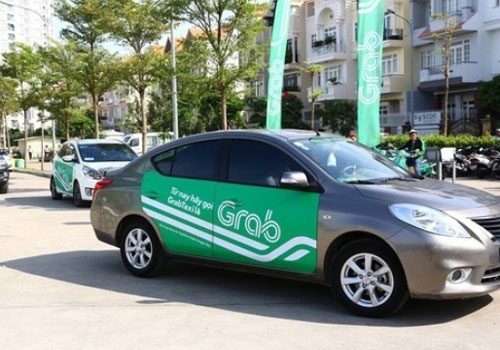Legislators vacillating between ride-hailing and traditional taxi
 |
| Vietnamese lawmakers are hard-pressed to navigate between old and new, vacillating between ride-hailing apps and traditional taxi companies |
While the Ministry of Transport (MoT) maintained its proposal that all ride-hailing firms have to affix ‘taxi’ signs to the top of their vehicles, the Ministry of Justice (MoJ) opposes the proposal.
The MoJ has recently sent an official dispatch No.1354/BTP-PLDSKT to the MoT to provide feedback for the latest amended draft decree, which would replace Decree No.86/2014/ND-CP on business conditions for automobile transportation.
Accordingly, the MoJ suggests removing the clause that would require ride-hailing cars below nine seats – such as the ones Grab, Go-Viet, and FastGo use – to install signs saying “contract vehicle.” The MoJ says that this provision is unnecessary as all kinds of contract vehicles are already equipped with taxi badges, showing that they are “contract vehicles.”
The MoJ requested more time to clarify the nature of ride-hailing apps like Grab and come up with the appropriate management solutions and ensure fair and transparent competition.
It is clear that the fierce battle between traditional and disruptive businesses is causing a headache for policymakers in Vietnam. The booming ride-hailing industry including the likes of Grab, Go-Viet, FastGo, and Be brings tremendous benefits to both consumers and taxi partners but is shaking up the traditional taxi industry.
With the rise of ride-hailing services, some traditional taxi firms and associations are resorting to anti-competitive practices to battle with rivals and slow down the fast-paced development of disruptive businesses.
Some traditional firms blamed their losses and ineffective performance on their rivals instead of innovating themselves to remain competitive. Meanwhile, traditional taxi associations and unions continue to fight disruptive businesses with misleading information and untrue accusations.
Some taxi firms are mixing up the concepts of GrabTaxi and GrabCar to accuse Grab of violating regulations. The misleading information that fails to clearly differentiate services based on Grab’s licenses will adversely affect Grab’s operations. This is a sign of anti-competitive practices and goes against international competition law.
According to Julien Brun, managing partner of CEL Consulting, the battle between traditional taxi companies and platforms like Grab is not unique to Vietnam. Many other countries, including the US where the model has been developed first through Uber, had to resolve this legislation ambiguity. The underlying trade-off behind such a decision is ensuring that the traditional taxi companies can maintain a decent level of activities while allowing other companies to innovate in order to offer better value for money to consumers.
“Such a case highlights the challenge for disruptive businesses that follow a completely new economic model, one which does not perfectly fit the legislative framework. Should the framework evolve or should companies try to fit into pre-cast moulds? Politically, it is about the balance between favouring innovation versus ensuring compliance,” he added.
Ngo Thanh Tung, managing partner of Vietnam International Law Firm (
Citing the lawsuit between Grab and Vinasun, he noted that this sets an unprecedented case reflecting the mindset of the judicial system on new business trends and creativity, a legal fight between the new and the old, between short-sighted protectionism and competition, between the fearful and the brave.
In the battle, anti-competitive practices will cause a devastating impact on a brand's revenue and prestige, making the country less attractive in the eyes of foreign investors. It could even affect investor confidence in Vietnam, resulting in slow foreign inflows in the country.
Lawyer Truong Thanh Duc, chairman of Vietnamese law firm Basico, stated that traditional taxis and associations can be sued for anti-competitive practices damaging rivals’ reputation, assets, and earnings. In this case, Vinasun and other traditional taxi firms can be sued for affixing banners on their cabs to protest against ride-hailing firms like Grab and Uber.
With the Comprehensive and Progressive Agreement for Trans-Pacific Partnership (CPTPP) already in effect and the EU-Vietnam Free Trade Agreement (EVFTA) expected to be ratified next year, Vietnam needs to make greater efforts to ensure full compliance with the FTAs.
Among them, there are regulations to limit the state’s intervention in e-commerce activities like ride-hailing apps. Before the proposed rules can come into force, legislators will need to carefully consider whether the current legal framework falls in line with Vietnam’s FTA commitments and does not stunt the country’s efforts to embrace new technology in Industry 4.0.
What the stars mean:
★ Poor ★ ★ Promising ★★★ Good ★★★★ Very good ★★★★★ Exceptional
Related Contents
Latest News
More News
- Masan Consumer names new deputy CEO to drive foods and beverages growth (February 23, 2026 | 20:52)
- Myriad risks ahead, but ones Vietnam can confront (February 20, 2026 | 15:02)
- Vietnam making the leap into AI and semiconductors (February 20, 2026 | 09:37)
- Funding must be activated for semiconductor success (February 20, 2026 | 09:20)
- Resilience as new benchmark for smarter infrastructure (February 19, 2026 | 20:35)
- A golden time to shine within ASEAN (February 19, 2026 | 20:22)
- Vietnam’s pivotal year for advancing sustainability (February 19, 2026 | 08:44)
- Strengthening the core role of industry and trade (February 19, 2026 | 08:35)
- Future orientations for healthcare improvements (February 19, 2026 | 08:29)
- Infrastructure orientations suitable for a new chapter (February 19, 2026 | 08:15)

 Tag:
Tag:



















 Mobile Version
Mobile Version